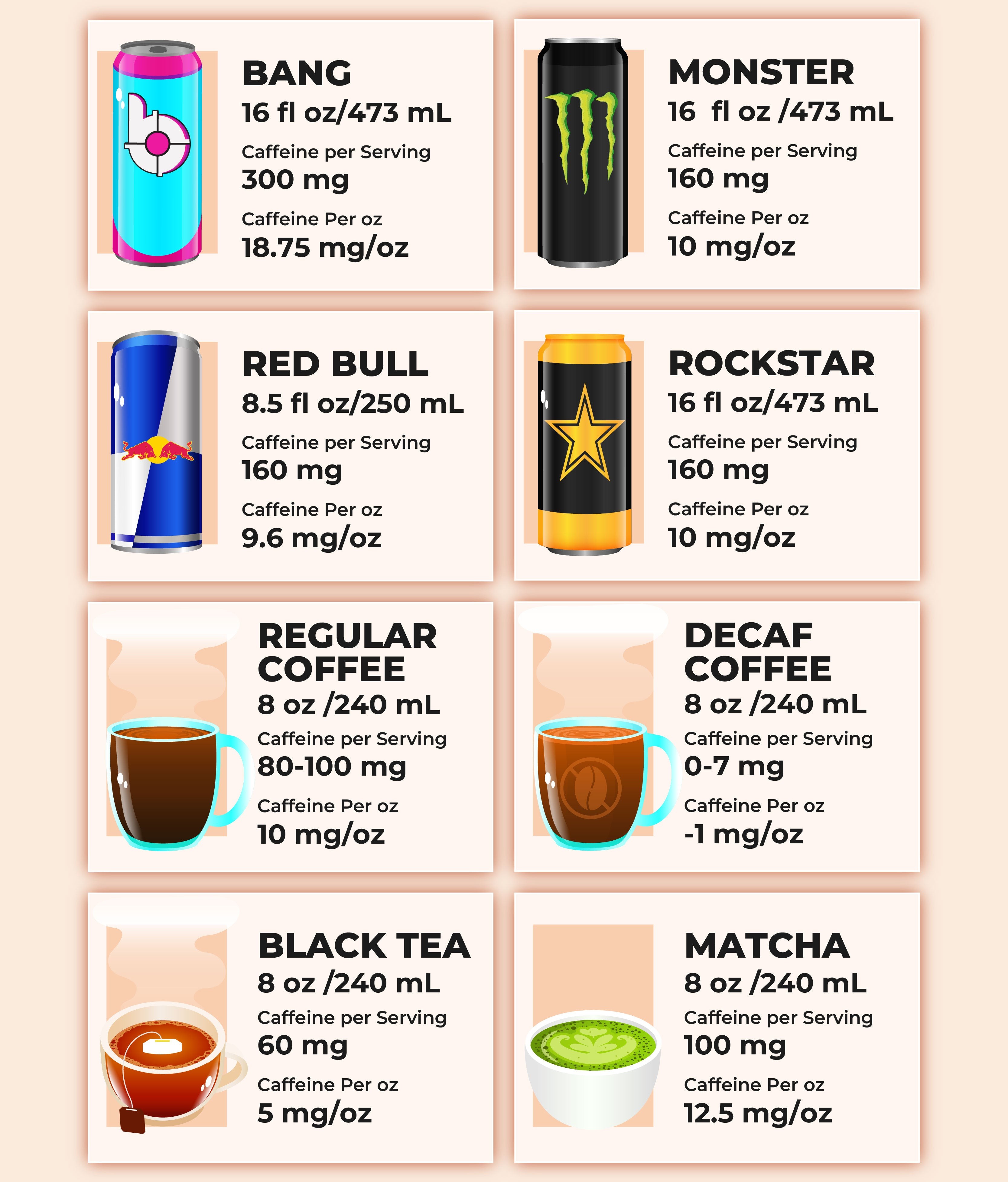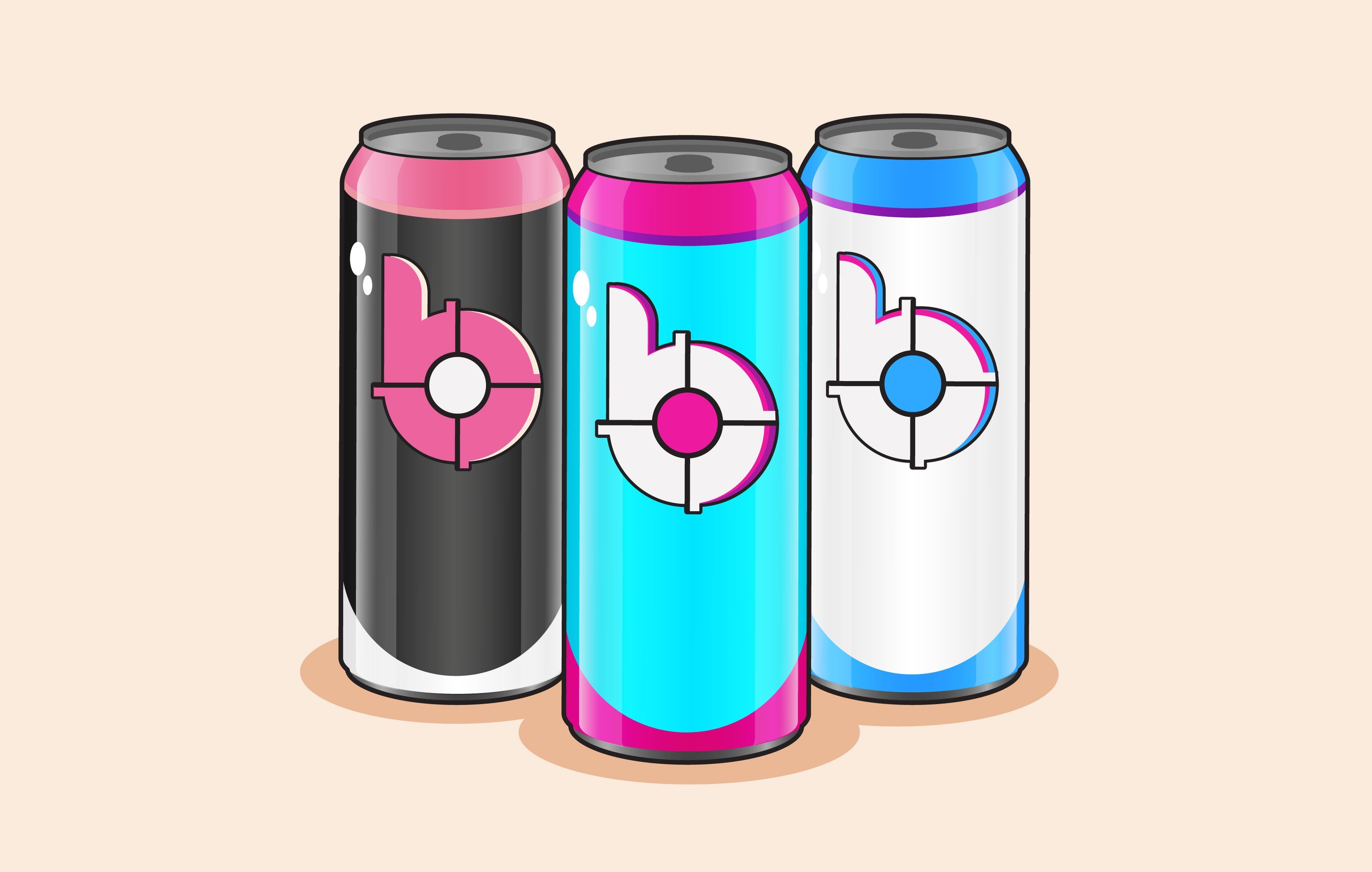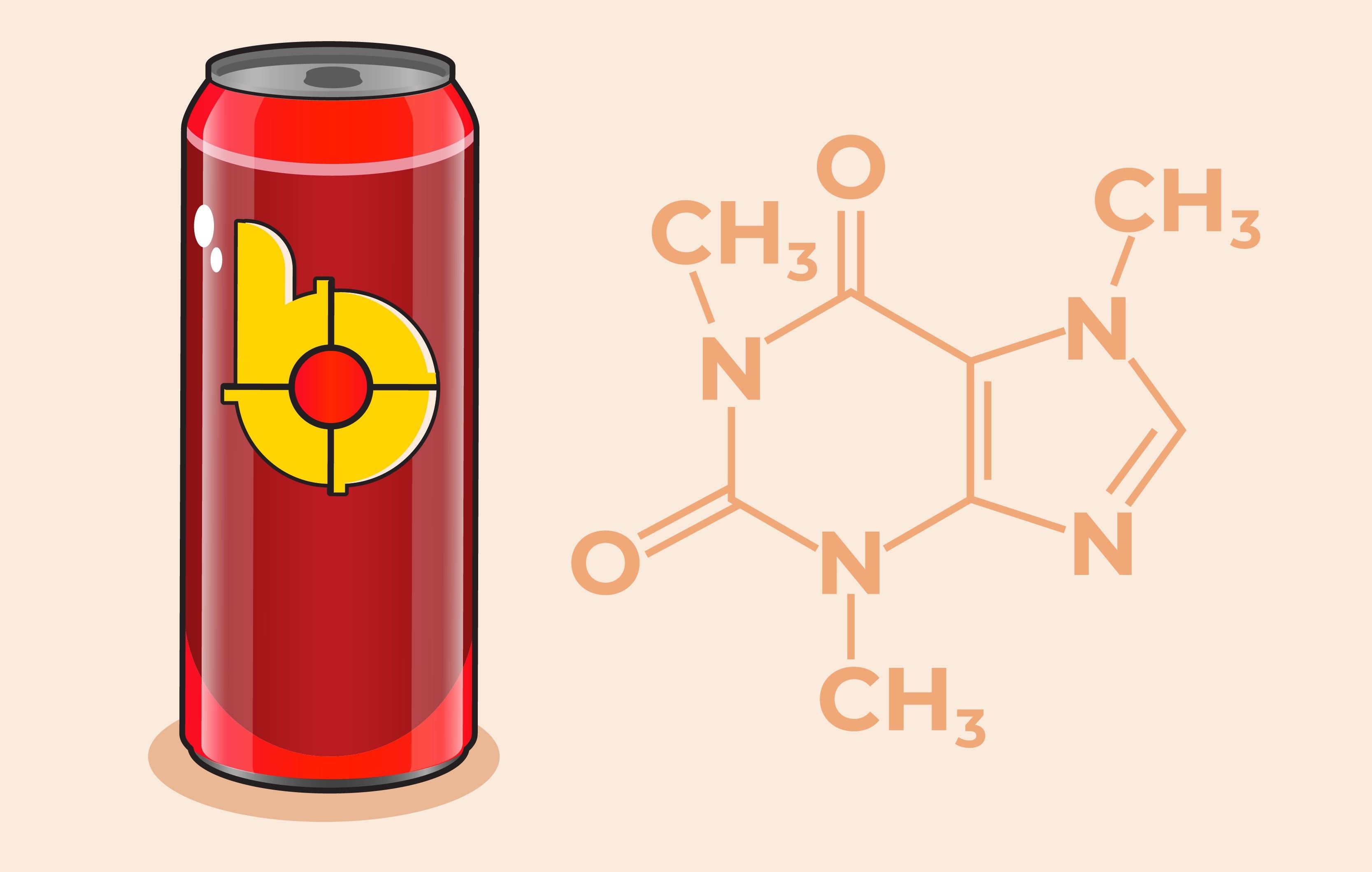Bang Energy drinks are a popular choice for those needing an energy boost, but just How Much Caffeine Is In A Bang? HOW.EDU.VN delves into the caffeine content of Bang, comparing it to other beverages and offering insights into safe consumption. Discover the potential effects of these drinks and explore healthier alternatives for sustained energy and avoid those energy crashes.
1. Caffeine Levels in Bang Energy Drinks: A Detailed Overview
Energy drinks are marketed as enhancers of energy, physical performance, and mental acuity due to their high doses of caffeine and other ingredients. Bang Energy drinks stand out because they contain significantly more caffeine than other caffeinated options, packing 300 mg of caffeine per can. This amount is over three times the caffeine content found in an average cup of coffee. Understanding these levels is crucial for consumers looking to manage their caffeine intake effectively.
1.1. Caffeine Comparison in Popular Beverages
To put the caffeine content of Bang Energy drinks into perspective, let’s compare it with other common caffeinated beverages:
| Beverage | Caffeine Content (Approximate) |
|---|---|
| Bang Energy Drink | 300 mg |
| Average Cup of Coffee | 95 mg |
| Red Bull (8.4 oz) | 80 mg |
| Monster Energy (16 oz) | 160 mg |
| Coca-Cola (12 oz) | 34 mg |
| Black Tea (8 oz) | 47 mg |



This comparison clearly illustrates that Bang Energy drinks contain a substantially higher caffeine concentration compared to other popular beverages. This is an important consideration for individuals monitoring their caffeine intake.
1.2. Anhydrous Caffeine: Understanding the Semi-Synthetic Source
Bang Energy drinks, like many other energy boosters, utilize anhydrous caffeine, a processed form of caffeine. While it originates from the same sources as regular coffee, such as coffee plant seeds and leaves, it undergoes further refinement in a lab to increase its concentration and purity. A single teaspoon of this highly potent chemical is equivalent to approximately 28 cups of regular coffee. This concentrated form of caffeine intensifies the drink’s effects, rapidly promoting alertness by suppressing adenosine, a neurotransmitter that induces sleep.
2. Health Implications of High Caffeine Consumption: Awareness is Key
The Food and Drug Administration (FDA) suggests that healthy adults can safely consume up to 400 mg of caffeine per day. This limit is approximately equivalent to four to five cups of coffee, eight cups of tea, or two standard energy drinks. However, due to the elevated caffeine concentration in Bang Energy drinks, consuming more than one can per day may lead to adverse health effects.
2.1. Potential Adverse Health Effects
Exceeding the recommended caffeine intake can trigger several adverse effects, including:
- Anxiety or Nervousness: Heightened adrenaline levels can activate the body’s fight-or-flight response, leading to increased anxiety.
- Jitteriness: As a stimulant, caffeine can cause physical agitation and tremors.
- Insomnia: High caffeine consumption can disrupt sleep patterns, causing difficulty in falling asleep or premature awakenings.
- Diarrhea or Vomiting: Caffeine’s laxative properties can lead to digestive disturbances.
- Addiction: Regular use can result in psychological or physical dependence.
- High Blood Pressure: Stimulation of the nervous system can cause an elevation in blood pressure.
- Heart Palpitations and Chest Pains: These symptoms are more prevalent in young people who consume energy drinks, resulting in an increased heart rate.
- Withdrawal Fatigue: As caffeine levels decrease, the initial energy boost fades, leading to fatigue.
- Frequent Urination: Caffeine acts as a diuretic, increasing the frequency of urination.
- Headache, Dizziness, or Delirium: These can arise when caffeine affects circulation and blood vessel movement in the brain.
If you experience any of these symptoms after consuming a caffeinated beverage, it’s crucial to seek immediate medical attention. It’s always best to err on the side of caution.
2.2. Who Should Avoid Bang Energy Drinks?
Bang Energy explicitly states that its products are not recommended for children, pregnant or nursing women, or individuals with caffeine sensitivity. These groups are particularly vulnerable to the adverse effects of high caffeine levels.
It is also advisable to avoid Bang Energy drinks if you have certain pre-existing health conditions, such as:
- Anxiety disorders
- Bipolar disorder
- Bleeding disorders
- Heart conditions
- Diabetes
- Epilepsy
- Glaucoma
- High blood pressure
- Parkinson’s disease
- Schizophrenia
It’s important to remember that individual tolerance levels vary. The FDA’s recommended daily intake serves only as a guideline. Never exceed your personal caffeine threshold to avoid potential health risks.
3. The Evolution of Bang Energy: A Market Overview
Launched in 2012, Bang Energy quickly rose to become the fourth-highest-selling energy drink in 2023. However, the brand faced significant challenges when its CEO made unsubstantiated claims about the drink’s ability to cure neurological disorders.
Following a multimillion-dollar lawsuit from Monster Energy, Bang Energy declared bankruptcy in 2023 and was subsequently acquired by its competitor. This acquisition marked a significant turning point for the company.
The brand once offered a wide variety of products, including Bang Keto Coffee and Bang Natural, but these lines have since been discontinued, focusing on its core energy drink offerings.
4. Consumer Opinions on Bang Energy Drinks: A Mixed Bag
Bang Energy drinks have enjoyed considerable popularity, with over 47 million cases sold in 2021. They have gained traction in the fitness industry and found a niche within the keto diet community.
However, consumer reviews are mixed. Social conversations about Bang Energy declined sharply between 2023 and 2024, partly due to a growing consumer preference for healthier beverage alternatives and concerns about the high caffeine content.
Rankings of the “most popular flavor” also vary widely, although Black Cherry Vanilla consistently ranks high on the list. Consumers interested in trying Bang Energy drinks have a choice of various flavors, ranging from Peach Mango to Rainbow Unicorn.
5. Alternatives to High-Caffeine Energy Drinks: Healthier Options
If you’re concerned about the high caffeine content of Bang Energy or other similar drinks, several lower-caffeine alternatives can provide a healthier energy boost:
- Traditional Coffee: Options like Cafely OG SaiGon offer a rich flavor and natural energy boost with a blend of Arabica, Robusta, and Peaberry beans.
- Black Tea: Offers caffeine benefits without excessive intake, suitable for moderate consumption.
- Kombucha: Provides a gentle energy lift with B vitamins and a low caffeine content (10-15 mg per 8oz serving).
- Coconut Water: Loaded with electrolytes for rapid replenishment and a caffeine-free energy boost.
- Protein Shakes: Excellent post-workout beverages to replenish nutrients and provide a natural energy lift.
6. Addressing Your Concerns: How HOW.EDU.VN Can Help
Are you confused about caffeine intake and its effects on your health? Do you need personalized advice from trusted experts? HOW.EDU.VN connects you with leading Ph.D.s and specialists worldwide, providing tailored consultations to address your specific concerns.
- Connect Directly: Engage with top-tier experts for personalized advice.
- Tailored Consultations: Receive customized solutions for your unique concerns.
- Save Time and Money: Efficiently access expert guidance.
- Ensure Confidentiality: Trust in secure and reliable consultations.
- Practical Solutions: Get advice that is both actionable and effective.
Navigating the complexities of caffeine consumption can be overwhelming. At HOW.EDU.VN, we understand the challenges in finding qualified experts who can provide reliable and personalized guidance. Our platform simplifies this process, ensuring you receive the best possible advice from top professionals.
6.1. Unlock Expert Insights: Why Choose HOW.EDU.VN?
Choosing HOW.EDU.VN means opting for clarity and confidence in your decision-making. Our experts are committed to providing insights that are both thorough and easy to understand, helping you make informed choices about your health and well-being.
The benefits of consulting with our Ph.D.s include:
- Expert Guidance: Access professionals with years of experience and expertise.
- Personalized Advice: Receive solutions tailored to your specific situation.
- Informed Decisions: Make choices with confidence, backed by expert insights.
- Comprehensive Support: Get answers to all your questions in one convenient place.
Don’t let confusion hold you back. Let the specialists at HOW.EDU.VN guide you towards healthier, more informed choices.
6.2. Real Solutions from Top-Tier Experts
At HOW.EDU.VN, we bridge the gap between you and over 100 renowned Ph.D.s across the globe. Our experts specialize in a wide array of fields, ensuring you receive the best possible advice tailored to your specific needs.
Here’s a glimpse of how our specialists can transform your approach:
| Expertise | Benefits |
|---|---|
| Nutrition Specialists | Optimize your diet and understand how caffeine impacts your health, ensuring you maintain a balanced and energetic lifestyle. |
| Medical Professionals | Receive personalized health advice, addressing concerns about caffeine’s impact on your body and providing strategies for safe intake. |
| Fitness Coaches | Tailor your exercise routines to complement your energy levels, helping you achieve peak performance without risking overstimulation. |
| Wellness Experts | Develop holistic strategies to balance energy levels, manage stress, and improve overall well-being through lifestyle adjustments. |
With HOW.EDU.VN, expert support is at your fingertips. Embrace the opportunity to transform your health and well-being with the guidance of the world’s leading specialists.
7. FAQs: Bang Energy Caffeine Content
If you still have questions about the caffeine content of Bang Energy Drinks, here are answers to some frequently asked questions:
7.1. How much caffeine is in a Bang Energy drink compared to a cup of coffee?
A can of Bang contains roughly three times as much caffeine as an average cup of coffee. This high concentration makes it essential to monitor your intake carefully.
7.2. Is it safe to drink Bang Energy drinks every day?
While a single can of Bang falls within the daily caffeine intake recommended by the FDA, daily consumption is not recommended for everyone, particularly over extended periods. Consider the potential long-term effects and your individual tolerance.
7.3. Can Bang Energy drinks cause caffeine overdose?
Yes, consuming multiple cans in a short period, or even within a single day, can lead to caffeine overdose. It’s crucial to adhere to recommended limits and be aware of your body’s response.
7.4. Are there any caffeine-free versions of Bang?
No, all available Bang Energy drinks contain the same high amount of caffeine. If you are sensitive to caffeine, explore alternative beverages.
7.5. How does Bang’s high caffeine content affect workout performance?
Bang can increase alertness and energy, potentially enhancing workout intensity. However, it’s important to balance this with the risk of overstimulation and adverse effects.
7.6. Is Bang suitable for children?
No, Bang Energy drinks are not recommended for children due to their high caffeine content, which can have detrimental effects on their developing bodies.
7.7. Is Bang suitable for adults?
Bang Energy drinks are not recommended for pregnant or nursing women or those with caffeine sensitivity. Healthy adults should consume it in moderation, being mindful of their personal tolerance levels.
7.8. How does Bang’s caffeine content compare to other energy drinks?
Bang Energy drinks generally have a higher caffeine content than most other energy drinks, making it one of the more potent options available.
7.9. Can Bang Energy drinks help you lose weight?
While often marketed as a weight loss aid, energy drinks are often associated with poor weight loss behaviors and unhealthy body image. Focus on balanced nutrition and exercise for sustainable weight management.
7.10. What are some natural alternatives to Bang?
Natural coffee blends, like Cafely Sai Gon OG, have lower caffeine levels and are a healthier and more natural alternative to energy drinks. These options provide a more balanced and sustainable energy source.
8. Connect With Experts Today: Your Path to Clarity Starts Now
Ready to take control of your health and well-being with expert guidance? Contact HOW.EDU.VN today and unlock the insights you need to make informed decisions. Our team of over 100 Ph.D.s is ready to provide personalized consultations tailored to your specific needs.
Don’t wait to get the answers you deserve. Reach out to us now and experience the difference expert guidance can make.
Contact Information:
- Address: 456 Expertise Plaza, Consult City, CA 90210, United States
- WhatsApp: +1 (310) 555-1212
- Website: HOW.EDU.VN
Let how.edu.vn be your trusted partner in achieving a healthier, more informed lifestyle. Connect with us today and start your journey toward well-being.
9. References:
- U.S. Department of Health and Human Services. (n.d.). Energy drinks. National Center for Complementary and Integrative Health. https://www.nccih.nih.gov/health/energy-drinks
- Ribeiro, J. A., & Sebastião, A. M. (2010). Caffeine and adenosine. Journal of Alzheimer’s Disease: JAD, 20 Suppl 1(20), S3-15. https://doi.org/10.3233/JAD-2010-1379
- Commissioner, O. of the. (n.d.). Spilling the beans: How much caffeine is too much? U.S. Food and Drug Administration. https://www.fda.gov/consumers/consumer-updates/spilling-beans-how-much-caffeine-too-much
- USDA. (2020). Dietary Guidelines For Americans. Ninth Edition. https://www.dietaryguidelines.gov/sites/default/files/2020-12/Dietary_Guidelines_for_Americans_2020-2025.pdf
- A;, M. A. S. A. (n.d.). Energy drinks and atrial fibrillation in young adults. Clinical nutrition (Edinburgh, Scotland). https://pubmed.ncbi.nlm.nih.gov/28527645/
- Higgins, J. P., Tuttle, T. D., & Higgins, C. L. (2010, November). Energy beverages: Content and safety. Mayo Clinic proceedings. https://www.ncbi.nlm.nih.gov/pmc/articles/PMC2966367/
- EG;, J. A. H. K. (n.d.). Energy Drinks, weight loss, and disordered eating behaviors. Journal of American College Health : J of ACH. https://pubmed.ncbi.nlm.nih.gov/24635529/